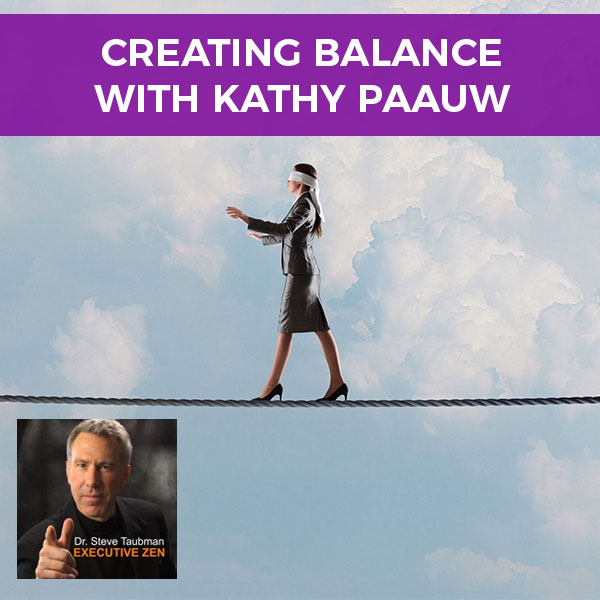
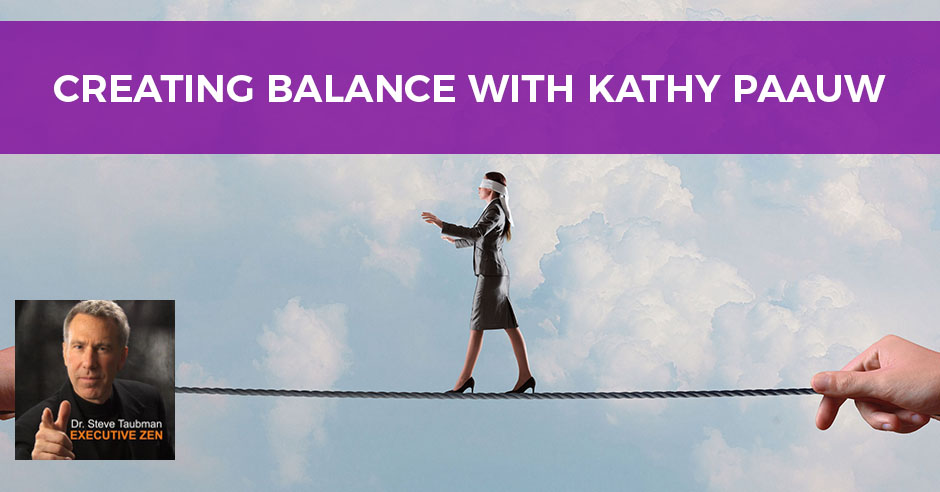
In this episode, I speak with Life Architect Kathy Paauw. Kathy and I go way back! She’s brilliant, wise, and insightful about what it takes to break through and create a rewarding and balanced life.
I’ve seen Kathy do this with teams of network marketers, and now she’s applying her wisdom and experience to business owners, entrepreneurs, and leaders.
This segment will most definitely wake you up to the importance of an “architected life.” I invite you to listen carefully, humble yourself, and open to ideas that may seem counterintuitive but will improve your business outcomes…and your sanity! 🙂
—
Listen to the podcast here:
Creating Balance with Kathy Paauw
We’re talking about creating balance in your work and personal life. I’ve got a guest with me who makes her living showing others how to do that. This is a woman whom I’ve come to know and appreciate. She has made a difference in a couple of industries and is focusing all of her attention on creating balance for executives or people who are trying to truly make a difference in their lives. You’ll get a lot of value out of the conversation. I thought I’d give you my wrap on the issue of balance. In my life, the balance has always been a challenge. From talking to others, that’s not an unusual point of view. We’d like to think that we are balanced, that we’ve got our work and our own lives all equally attended to. Yet, more often than not, we’ve got attention in one place and we’re neglecting other areas of our lives.
From my study of the subject and from my interviews with others who have explored the subject, we have a tendency to expect ourselves to be in constant balance. As if that means that at any one given moment, our attention is equally dispersed between our personal, spiritual, relational, and financial parts of our lives and that all those things are being attended to in equal measure at any one given moment. I don’t think that anymore. There are times in my life when my attention and my focus have been strongly in one area or another where I’m working on an initiative, a project, and all my resources are going toward that project.
That’s what’s necessary at that moment for me to successfully meet the challenges, to meet the demands, to overcome the obstacles, and to reach the goals that I’ve set for myself. In doing that and in those moments, there is that whispering voice in my head that says, “What about your family? What about your hobbies? What about this? What about that?” I’ve come to realize that I can engage those voices. I can try to push them away and feel guilty about the fact that I’m not being as present with other areas of my life as I am with this one. I can use this as an opportunity to recognize that there’s always going to be a voice in my head that tells me that whatever I’m doing is the wrong thing. There’s always going to be a voice telling you that there’s someplace else you should put your attention. It’s those shoulds again.
I’ve begun to creatively and deliberately put those voices in perspective. There’s got to be an intellectual part to this exercise where you’re not only aware that your balance may be off, but that you’re aware of it. In that higher level of awareness, that higher level of consciousness, you’re making decisions. Is it appropriate in this moment for me to decide to put all my attention in this one area to the exclusion of this other area? How long is it okay to do that for? The reality is that if my attention is divided in the name of balance, if I’m trying to honor these voices in my head that tells me you need to give equal weight to every single area of your life and at every single moment of your life, it then takes me off my focus. It gets me to be less productive, less effective because laser focus is what gets the job done.
Do what you’re doing with full awareness. Click To TweetLaser focus is the ability to bring your attention thoroughly into the moment. With laser focus, when it is not accompanied by that negative voice, that hungering, longing, “What about this? What about that?” when you’re able to bring it on the back, then you become present. What we’re beginning to teach people more and more in our society, thankfully, is being a little bit more aware of the importance of presence, the importance of present-time consciousness. I want to be all here. Those voices that tell me that I’m out of balance may not be serving me at this moment, but I need to give them their time. That’s where your calendar, your day planner is helpful.
There are times where you need to sit down and decide if you need to reapportion your activities or reevaluate your priorities. While you’re doing this thing that you’re doing, that’s not the time to have that conversation with yourself. That’s the time to stay focused. If you are out of true focus, if you’re out of being truly present, that experience will make itself known to you in other ways. You may start to notice that what used to be a passion project, where your focus was quiet, laser-driven, and driven by a sense of joy and possibility, that sometimes you’ll wake up and say, “For the last couple of days, that thing I’ve been doing wasn’t passion, that was an obsession. I’m not waking up feeling like, “I’ve got to give all my attention to this thing.” It’s more like, “I’ve got to give all my attention to this thing.” There’s a fear that creeps in, a fear of loss or a fear that you’re not going to accomplish what you want. That obsessive-driven quality doesn’t present itself when you’re in a true state of focus and a true state of balance.
I’m going to suggest that your balance is a moving target, like juggling. You’re focusing on the ball that’s coming down, not on the ball that’s halfway back to your hand. You become present so that you’re ready for the next ball. That’s how balance happens, the elegant effortlessness of the juggler. The ability to recognize that not everything gets your attention equally at all times in all moments. Instead, you give all of your attention, all of your focus, all of your presence to the job at hand. You remain present and mindful enough to know whether or not the quality of your presence has true quality to it. Are you in the game? Are you doing it with passion? Are you focused? Are you driven and obsessed? If you are, that quality of presence doesn’t translate well into other areas of your life. You won’t be able to go from being obsessive to walking into your home, sitting out at the dinner table and giving your best to your family because you’ve generated suffering. If you’ve generated suffering, that will carry over into other areas of your life. It will short-circuit your ability to experience balance.
If that makes any sense to you, I’m grateful. If I were to encapsulate it in a few words, I would say be here now. Do what you’re doing with passion and focus and let yourself be extremely present with what you’re doing. When the next thing comes along, close the door on the last thing and then be extremely present with that next thing with passion, joy, not with obsession. If you could take each moment of your life, live it fully, and being fully present, then you will ultimately, in the grand scheme of things, have balance. Therefore, you won’t have to feel you’re lamenting the fact that you’ve put too much attention on one thing than the other. Do what you’re doing with full awareness.

Creating Balance: If you could take each moment of your life and live it fully by being present, then you will ultimately have balance in the grand scheme of things.
Having said all that, we have a guest who is an expert in the area of balance and organization. She’s got a lot to say about this. Some of what she has to say may be supportive of what I’ve said. Some of what she has to stay may be exactly the opposite of what I’ve said. Maybe she’ll tell me I’m full of it. She’s one of the best-known trainers first in the network marketing space and now, out in the general public for groups, for corporate groups, for individuals seeking a greater clarity about their lives. That is Kathy Paauw. Our topic is balance.
—
My guest is Kathy Paauw. She is a Life Architect. She helps people create blueprints to help them develop a path to move toward a purpose-driven, productive life. She loves helping people, particularly busy professionals overcome overwhelm and de-clutter their lives, their space, their minds. In that way, they can focus on what matters most to them and achieve the life of their dreams. She’s come through a couple of successful incarnations. What she does is not just what she’s learned in a book, but is about being a thoughtful, interesting person who’s lived a real life and has come through the school of hard knocks. I met her through a network marketing company at which I was speaking and we hit it off instantly. We’ve stayed in touch ever since and I was honored that she agreed to be one of my guests on the show. Let me welcome my friend, Life Architect Kathy Paauw.
Thank you, Steve. I appreciate your invitation for me to be here. I was listening to what you had to say before you introduced me. You are so spot on about balance. When people think of balance, they often think of a balanced scale and in order to be balanced, it has to be equal. With balance, you have nine different areas of your life. If you’re focused on one area all the time, you’re going to be out of balance. It doesn’t mean that each of those nine areas has to be equal all the time.
I tell my audience I’m going to give you my rap and then I hope and pray that it’s not completely diametrically opposed to what my brilliant guests have to say. Obviously, if it is, then their point of view holds greater sway than mine. You’re smart, you’re experienced and you seem to agree with what I said so I appreciate that. Where have you been lately? What’s going on in your life, Kathy?
I’ve been doing a lot of travel. I got back from Japan and Dallas. I’m heading off to Mexico. I love to travel. I love that my work enables me to travel. Sometimes I work while I’m on the road. I was doing Skype coaching calls while I was in Japan. My husband was there for his work and I like to travel with him. When he’s working, I’m working in the hotel room. It works out pretty well.
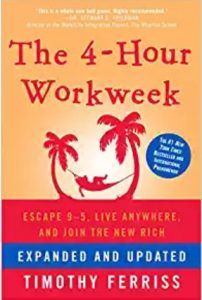
The 4-Hour Workweek: Escape 9-5, Live Anywhere, and Join the New Rich
I remember reading that book, The 4-Hour Workweek by Tim Ferriss. Tim was talking about how we often live this life delaying our happiness, delaying the life of our dreams. By the time we get to retirement, we’re too old, sick or dead to appreciate it. Instead, you’ve found a way of living a life where you get to do what you love to do while you’re doing what you love to do.
I’ve been there, I’ve done that. I used to do the delayed gratification and realized that tomorrow is not promised to any of us. My brother died. He was 56 years old. We’re not promised any of that. My dad died at the age of 47. They both had heart attacks. One of the nine environments is your body, your self-care, and that’s a very important part. Tomorrow’s not promised to any of us. To put off the things that we love and what we’re passionate about is sad. That’s the best way I can say it.
I’d like you to share a little bit of your personal story. You may go back as far as you’d like, but I was thinking about the fact that I met you in the context of network marketing. You were a very successful network marketer, and now you’ve shifted your focus. Can you talk a little bit about that?
I was a music major in college. After college, I got married and I started looking for a job. I needed to support the two of us for the next four years while my husband was in medical school. I landed a job in a music-related nonprofit organization. While I was originally happy and I felt lucky that I could find that work, there’s not a huge demand for music majors. The work itself was not a good fit for me. I climbed the ladder in that profession. I was in resource development, fundraising. After thirteen years of climbing the ladder in a field that just wasn’t me grinding it out, I received the gift of unemployment. When the last nonprofit I worked for had a budget crisis, my job was eliminated.
Being laid off was one of the best gifts I ever received. Although I didn’t feel like it was at that time, I felt like a baby bird that got kicked out of its comfortable nest and I had to learn to fly. That’s when I started on my path of self-discovery to identify what I felt called to do. That’s what led me to launch my own business in 1995. I’ve combined my background as a productivity consultant with my training as a certified coach. Jack Canfield is my mentor and I’m a huge fan of his work. I’ve also become one of his Certified Success Principle Trainers. I came to realize the power of leverage being in business for the last 22 years. As a solopreneur, I get 168 hours a week like everyone else. I’ve learned the importance of delegating some tasks to others so that I can keep my focus on the work that I’m best at and I’m most passionate about.
I also was introduced to network marketing back in 2005, about ten years after I started my business. The company offered a product and service that encourages the expression of gratitude and helps people build important relationships, it was a good fit for me and what I’m all about. It generated that leveraged income that I wanted as a solopreneur. I started that as a side business and it grew so large within a couple of years that I was struggling with that balance thing. I was doing my coaching and consulting and also building my network marketing business. I had about 1,500 team members and customers and it got crazy. After several years of that, and that was very successful for me, I decided to bring my coaching and consulting work back as my central focus. I still have my network marketing business, and I’m also clear about where I choose to devote most of my career, energy and time. That’s the backstory of what’s gotten me to where I am.
The first thing that you said that gave me a little chuckle was the gift of unemployment.
It was a gift and it did not feel like it at that time.
Being alone is not as bad as you think because you could recreate your life the way you wanted to. Click To TweetIn my work, I do a lot of work with business people. I also work with people on the personal level, people who have got challenges in regard to their sense of fulfillment, happiness, what their path is or bad relationships. I posted this on my Facebook page. I had done a hypnosis show, an entertaining show for a group of high school graduates. In the middle of the show, this angry, jealous, clearly unbalanced, unhinged guy got up. He started yelling at me and yelling at his girlfriend for having the audacity to be affectionate while in hypnosis to an imaginary person. This guy was trapped by his own sense of jealousy and rage. He was clearly an abusive boyfriend. It was a scary moment.
We put it aside and took care of it. I took the chaperones aside and told them, “This girl needs to learn how to be empowered and you’ve got to keep this guy away from her for now.” What I realized at that moment was that when this guy was wailing against this girl on me, she was acting like the obedient servant. She wasn’t reactive to him. She was clearly somebody who had been abused before. We all see that sometimes. We see people who take things from people. They’re abused. This woman was abused, maybe a victim, a battered housewife. What I realized was that people often make these little micro choices based on a lack of consciousness.
In her case, she had to decide between the threat of this guy who’s probably hit her and the threat of being alone. She chose probably, again and again, to be with a guy who would abuse her because the threat of being alone was unthinkable. I think of people in unhappy businesses the same way. I think of people who are in a job that isn’t serving them like being in an abusive relationship. They’re choosing between being abused and being alone, being out there trying to figure out how to make it on their own. The fact that you accepted the gift of unemployment, you left the abusive relationship and realized that being alone wasn’t bad because you could recreate your life the way you wanted to.
It took me a little while. I didn’t receive the gift as a gift immediately. I was initially upset. Once I started reflecting, I realized, “This hasn’t been a good fit for me for thirteen years of my life.” How many people do we know who do that for their entire life? They feel stuck. They feel not having a choice. We all have a choice. I’m big on language. When I hear people say, “I should. I got to. I have to.” I say, “Quit shoulding on yourself and be a choice.” “I choose to,” is much more empowering than, “I should, I got to and I have to.” I’m not saying be irresponsible. Let’s say you’re raising a family, you have a nice income, and you hate your job. While you’re continuing to work that job that you hate, be actively working at figuring out something else that feeds your soul.
You’re around a lot of people who are exactly in that situation. What do you find is the thing that stops them from doing that?
The fear of the unknown, fear of self, “Do I have what it takes to do what I want to do?”
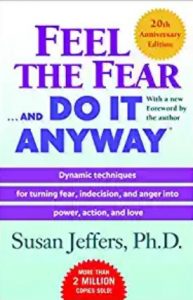
Feel the Fear … and Do It Anyway
Fear of failure. There’s so much fear. I love the book, Feel the Fear and Do It Anyway. If we can acknowledge the fear, “There it is,” feel it, work through it and say, “It’s not going to kill me.”
The reason I brought up the abusive relationship, which was off-topic but in a way it wasn’t, is because we do these things to ourselves all the time, whether it’s in a relationship, in work or in lifestyle. We think we don’t have a choice. When we explore the possibility of the choice, fear cripples us or a sense of unworthiness, “I can never do this.”
All of that boils down to fear, “Fear that I can’t do it. Fear that I’ll make a fool of myself.” There are many things that we fear. When we can face fear, acknowledge it and work through it. It’s not bad. I love this exercise that we do in coaching called walking the plank where you say, “So then what?” If you say, “I don’t want to do this because I’m afraid of X, Y, Z,” and I keep walking the plank with my client. What is the worst possible thing that could happen? If we work through the what-ifs and then I say, “If the worst thing happened, could you live with it?” In most cases, people say, “Yes, I could.” The chances are of the worst thing happening are not great anyway. Even if it did, “I could live with that.”
You’re basically taking people away from the looming unknown. It’s like, “Let’s walk into that dark, scary place and find out that it’s not all dark and scary after all.” Let’s talk about the nine areas of life that are necessary to achieve balance.
Thomas Leonard was the founder of coaching. He created a wonderful model called The Nine Environments of You. I wrote a blog about that on my website. I invite people to take a look at that if they want to dive deeper into this. It’s an outstanding tool to help you identify where your life is out of balance. Balance doesn’t mean equal, it means looking at these different areas and saying what needs some attention. For example, the body is one of the nine environments. If you’re physically, mentally or spiritually ill, it’s going to affect the other eight environments. Another environment is your relationships. If you’re having major issues with a child, a spouse, significant other, a close coworker, etc., it’s going to affect the other eight parts of your life. They all work together. It’s important to have an awareness of all nine areas of your life. Some of those nine don’t have as much weight in my life as others. It’s important to be aware of them and to make choices. It comes back to choosing again.
If you are out of balance in one of those areas, isn’t there some truth to the idea that if you fix one area, it starts to help other areas? For example, if you fix your physical well-being, that’s going to have an impact on your relationships or your spiritual well-being.
There’s a synchronicity that happens when you’re working with all of them. Remarkable coincidences will happen as things fall into place in your life. The end result is that you’ll attract what you desire with much greater ease. It’s important to pay attention to all nine areas and balance those in your own way. Not equally but in whatever way works for you.
The fact that you said it in your own way, sometimes being conscious of an area is enough. You may not even have to take action in that area. You just have to be aware that that area even exists and observing yourself through that lens.
Many people live their lives not paying attention to what’s screaming at them. Click To TweetAwareness is important. How many people do we know who have lived their life and don’t pay attention to what’s screaming at them? Oftentimes, if we don’t get enough sleep, if we’re not eating right, if we’re not hydrated, if we’re not exercising, our bodies are screaming at us and we don’t hear.
I want to say something to bring this back because the show is called Executive Zen. We do talk to a lot of leaders, executives and C-suite people. Sometimes people in high-performance positions don’t necessarily identify themselves as being out of balance, but they probably are. A lot of them have gotten where they’ve gotten through true grit. It’s like, “I’m going to push through. I’m going to be resilient.” Isn’t what we’re talking about also important for them?
It’s important for every living human being. Without balance, creativity goes out the window. Resentment sets in. Your physical, mental, spiritual, and relationship health is at risk and burnouts ahead.
What you’re teaching has great application to our corporate audience. The imperatives that they have been taught is work, work, work until you achieve. Sometimes it’s hard to shake people’s tree and say, “That’s part of the formula, but another part of the formula is awareness and self-knowledge of where you’re out of balance.” Have you had people with whom you’ve worked, people in the more conventional world, corporate people in business, change their lives, change the quality of their work by attending to these other balanced issues?

Creating Balance: Having awareness of what you want and asking for what you want is really important.
I’m working with a client who’s done exactly that. She worked in a corporate position for twenty years. The values of that organization changed over the years and are no longer in alignment with her own values, so she made a decision to leave. She’s starting a new job and moving across the country. Those are pretty big changes for her. In the process of all this, she’s become more aware of her physical needs. Self is another of the nine environments that represent your personality, temperament, character, gifts, talents and strengths. In looking for another job, she paid a lot of attention to that because she wanted to move into a position that would honor those things. Spiritual is another one. Relationships, network, financial. Obviously, when you’re changing jobs, it’s going to affect your income. That could be in a positive or a negative way. She’s negotiated exactly what she wants. Having awareness of what you want and asking for what you want is important. Sometimes people don’t ask for what they want. She got it. I’m very proud of her.
If you don’t ask, you don’t get. What you’re saying is powerful. This is a great example of what I was asking. Here’s somebody who has been stuck in a particular box and you helped her to realize that she didn’t have to be in that box. That she could start attending to these other areas, balancing those other areas, and creating a life that works for her. I wrote two books that have done well. One of them is UnHypnosis, which is about just that, reflecting on your life and figuring out what you want to do when you grow up. The other one, Buddha In The Trenches, is more about you’re in a position. You’re not getting ready to get up and leave but how can you use these strategies to make where you are better? Are there examples of that in your work where you’ve got somebody who’s not trying to change their job? Maybe they like being the VP of sales for Toyota, but they still need something to be more effective and sane.
That’s where looking at the nine different areas of your life and saying, “What’s not getting the attention that it needs?” and making some shifts. There’s a coach up in Canada, his name is Dan Sullivan. He talks about how the more free time you take, the more money you make. There are three types of time that he talks about. There’s free time, focus time and buffer time. The buffer time is checking your email and doing all that other stuff that comes with the job. The focus time is when you’re doing the things that are going to generate the income. He works mostly with business owners, but this can apply in a corporate environment as well. If you’re really focused during your focus time, you’re going to do better work. It’s hard to be focused if your body’s falling apart, your relationships are broken, and your life has gone to hell in a handbasket. It’s hard to be focused because you’re putting out fires in all those other parts of your life. It does work together.
I’ve read that focus is finite. We can only do it so long before we’re forced to disperse our attention. If you’re trying to do a job by staying with your nose on the grindstone endlessly and you never give yourself that downtime, then your adrenal glands start to burn out. That’s why you start to develop all sorts of chronic diseases.
It isn’t possible to sustain that. That’s why the free time is important. Dan Sullivan talks about free time being 24 hours where you do absolutely no work. That sounds like a foreign thing to many people in our audience. His point is that if you don’t unplug, it’s not free time. With the advent of the internet, our lives changed significantly because twenty, 30 years ago we used to leave work. People could maybe page us or call us but now, they can email us, text us. We’re available 24/7 if we allow ourselves to be.
Balanced doesn’t mean equal. Click To TweetThat’s the magic word. A good friend of mine was here. He brought over his son and his son’s new girlfriend. I was explaining something to the son and the son’s girlfriend when Barry came walking out of the house with a little sticky note and handed it to her. It was obviously something that he said, “I’m going to give you a note.” Instead of holding the note in her lap, she had to look at the note and she completely stopped listening to me. It was like, “Don’t you realize that you’re in a conversation right now? Don’t you realize that just because somebody drops a note in your lap, it doesn’t mean you need to read it? Just because the phone rings doesn’t mean you need to answer it.”
Particularly our young people, but maybe older people too, social media has devastated. I know the depression rates went way up. People don’t communicate with each other face-to-face. You see kids in a room together texting each other instead of talking. It happens.
We’re laughing, but it’s tragic.
We need to put our phones down, communicate with each other, be fully present and be focused. That’s gone out the window.
What Dan Sullivan said was that, “The more free time you have, the more money you make.” That’s worth the price of admission.” You said people will work, work, work and not slow down, and then think they’re going to get results. I remember my grandparents had a funny plaque on the living room wall. It said, “The hurrier I go, the behinder I get.” Slow down, have faith, and that’s where balance lives. Thank you so much for sharing your wisdom with us.
Thank you for inviting me to do so. I love talking about this stuff.
Given this show is Executive Zen and we’re talking to leaders, what’s one important thing for leaders? If you were to talk to somebody who’s trying to be a better leader, what would be one thing you’d say to them?
It comes back to that balance. When you don’t have that balance, your creativity goes out the window. That’s where the more free time you take, the more money you can make, whether it’s for your own business or for the company you work for. Having that downtime frees us up to have that creativity. If you’re resentful about what’s being asked of you, maybe it’s you asking you to do it, maybe it’s not your boss. It’s amazing what we do to ourselves. The creativity goes out the window, the resentment sets in. When your life is out of balance, when you’re physically, mentally, spiritually and socially in trouble, your health is at risk in those areas. That’s a recipe for burnout, at the very least. Tending to these things is important. I have a challenge to share that is important for your audience to consider.
I know because I’m a leader and I’ve been in authority positions and in leadership positions that even when the voice in my head says, “You’ve got to slow down. You’ve got to stop.” There’s another part of me that’s like, “I don’t have time to stop. I’ve got to keep going.” It’s that obsessive quality that sometimes is hard to shut that down. When we’re talking to leaders in a show like this, granted people on the show are probably self-selected. People in our audience are probably more likely to be the kinds of who are willing to humble themselves to a new idea and not be defending their right to always be on and always have to work. We still have that voice. We still have that driving force inside of us. It’s not a bad thing, but we need to learn how to deal with it. What do you say to somebody who hears you say, “Downtime is important and freer time means more money?” That person says, “Yes, but.” They give you all their, “Yes, buts.” How do you help them realize how important what you’re saying is?
It’s important to acknowledge the voice. It’s there. We all have it. It doesn’t go away. It might be quieter at times but simply acknowledge it. I call that the gremlin. We have gremlins. They sit on our shoulders and yack at us sometimes more often than others. To simply acknowledge the gremlin and say, “I know that your intentions are good, gremlin. I know that you’re trying to protect me and you have my best interest in mind. I also know that what you’re saying isn’t true. There’s another truth and that truth is that I choose to pay attention to some other things. Thanks for sharing your concerns. I have another voice. My true self is my other voice on the other shoulder. I’m going to listen to that voice too. Thanks for your input. I’ll take it into consideration.”
Arrogance is the enemy of consciousness. What you’re suggesting is something that arrogant people will probably never do, but maybe those of you in the audience will at least give it a try. Try seeing the things that you think are so important as just a voice in your head, a gremlin on your shoulder. See if you can’t reframe what you think is important. Make decisions out of wisdom rather than obsession.
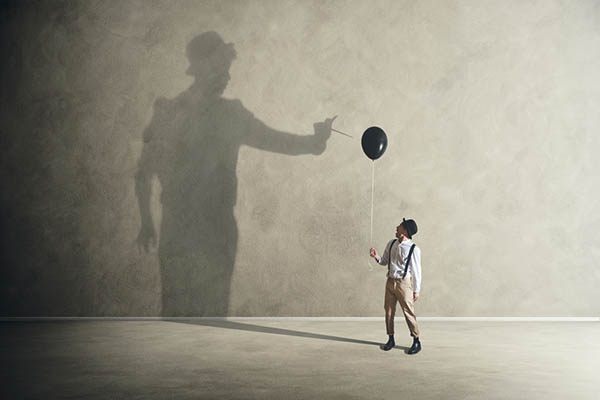
Creating Balance: Arrogance is the enemy of consciousness.
If you’ve enjoyed this, please send your comments to me at SteveTaubman@Gmail.com and feel free to suggest a topic. If you’d like to learn how to bring me to your company to create mindfulness in your organization and create a holistic culture of conscious leaders and fearless salespeople, contact me through SteveTaubman.com. We always end with a metaphor, a quote and a challenge. I’ve handed the reins off to my guests to give the challenge. The metaphor is usually separate from the quote, but the metaphor and the quote are rolled into one here because it’s something that Albert Einstein said, “Life is like riding a bicycle. To keep your balance, you must keep moving.” Stay in motion. It’s not so much a question of leaning into only one thing at a time, but basically staying in motion. Thank you, Albert Einstein. We always like to have a challenge for the week and Kathy’s going to share one with us.
I want to add a quote that ties in with the discussion, which is by Jim Rohn. He said, “You have two choices. You can make a living or you can design a life.” That’s what we’re talking about is designing our lives. I wrote a blog post that will help our audience to drill deeper on the topic of creating balance and looking at The Nine Environments of You. If you want to read that article, you can go to my website at OrgCoach.net. You can do a search for the title of the blog, which is Balance Your Life.
My challenge for the audience, I offer a tool to help you move from feeling overwhelmed to feeling at peace and in control of your life. It’s called a RAM Dump. RAM stands for random access memory. It’s a type of computer memory that can be accessed randomly. The RAM Dump exercise that I’ve created helps you to look at the RAM in your brain, which holds on to all those sticky notes in your life. These sticky notes represent incompletions, tolerations, irritations, and physical, mental, spiritual, and social messes in your life.
The RAM Dump contains a list of trigger questions to help you download the sticky notes from your brain onto paper. It provides instructions on how to make decisions about what to do with each one of those. You can access the RAM Dump exercise by visiting my website at OrgCoach.net/RAM-Dump or you can just go to OrgCoach.net, click on the little search icon in the upper right corner and do a search for RAM Dump. I invite you to download that and do it. It’s a full exercise, but it will help you to look at all corners of your life and identify the things that have been taking up residence in your brain that creates stress if we don’t deal with them.
Without balance, creativity goes out the window. Click To TweetHow long will it take to do the exercise?
There are nine pages of trigger questions and some of them may not apply to you, but you go through the questions and any that bring up sticky notes, you write them down. There’s a specific way to write them down and I give instructions in the RAM Dump for that.
Thank you so much, Kathy. I encourage everybody to do that. Share this with your friends and subscribe to my podcast. You could do this at Executive Zen on iTunes or find replays on my website SteveTaubman.com. Next, we’ll be joined by another great trainer in the area of corporate resilience, Founder of Epic Advantage, which provides executive leadership solutions that’s Jerome Wade. I am beyond grateful to have had Kathy Paauw with us here to share some wisdom about creating balance in your life. Kathy, you’ve been a wonderful guest. I’ve had a lot of fun having you here. Thanks to everybody for being with us. Thanks for reading Executive Zen. Remember to lead consciously and profit responsibly.
Important Links:
- Kathy Paauw
- The 4-Hour Workweek
- Certified Success Principle Trainers
- Steve Taubman’s Facebook page
- Feel the Fear and Do It Anyway
- The Nine Environments of You
- UnHypnosis
- Buddha In The Trenches
- Dan Sullivan
- SteveTaubman@Gmail.com
- OrgCoach.net
- Balance Your Life
- RAM Dump
- OrgCoach.net/RAM-Dump
About Kathy Paauw

Although I was born organized, I was also gifted with a very creative side. I had the great fortune of spending my senior year of high school at the Interlochen Arts Academy, which is located in a small town in northwestern Michigan. If you’ve never heard of it, think of the TV show Fame. It’s that kind of a place – where a small, select group of students study music, dance, drama, visual arts and creative writing.
I studied vocal performance and loved every minute of my time at Interlochen. However, as much as I love expressing myself through music, I chose not to pursue a performance career. If music sparks joy in you, I invite you to listen to some of my recordings.
After college, I married a wonderful man, and quickly entered the workforce at a non-profit music-related organization in a fundraising role. The job found me, and while I originally felt that I was lucky to find work (there’s not a huge demand for people with majors in music performance), the reality was that the work was not a good fit for me. Although I excelled at it with my strong organizational skills, the more time I spent doing this work, the harder it was to consider doing anything else.
After 13 years of grinding it out in a profession that wasn’t “me,” I received the gift of unemployment. When the non-profit had a budget crisis, my job was eliminated.
Finally, I took the opportunity to really think about what I felt called to do, and that’s what led me to launch Paauwerfully Organized.
Since 1995, I have been at the helm of my own business, combining my background as an Organizing & Productivity Consultant with my training as a Certified Professional & Personal Coach. I am also a Jack Canfield Success Principles Certified Trainer.
More than a coach, I consider myself a Life Architect. Assisting clients all over the globe, I work to help you identify the “why” of your life, and then help you couple that with the “how” to create systems and structures to support that “why.” Yes, it’s organizing – but it’s much more than teaching you how to clean up your desk. We’ll design a blueprint that helps you live a purposeful and productive life… the life you deserve!